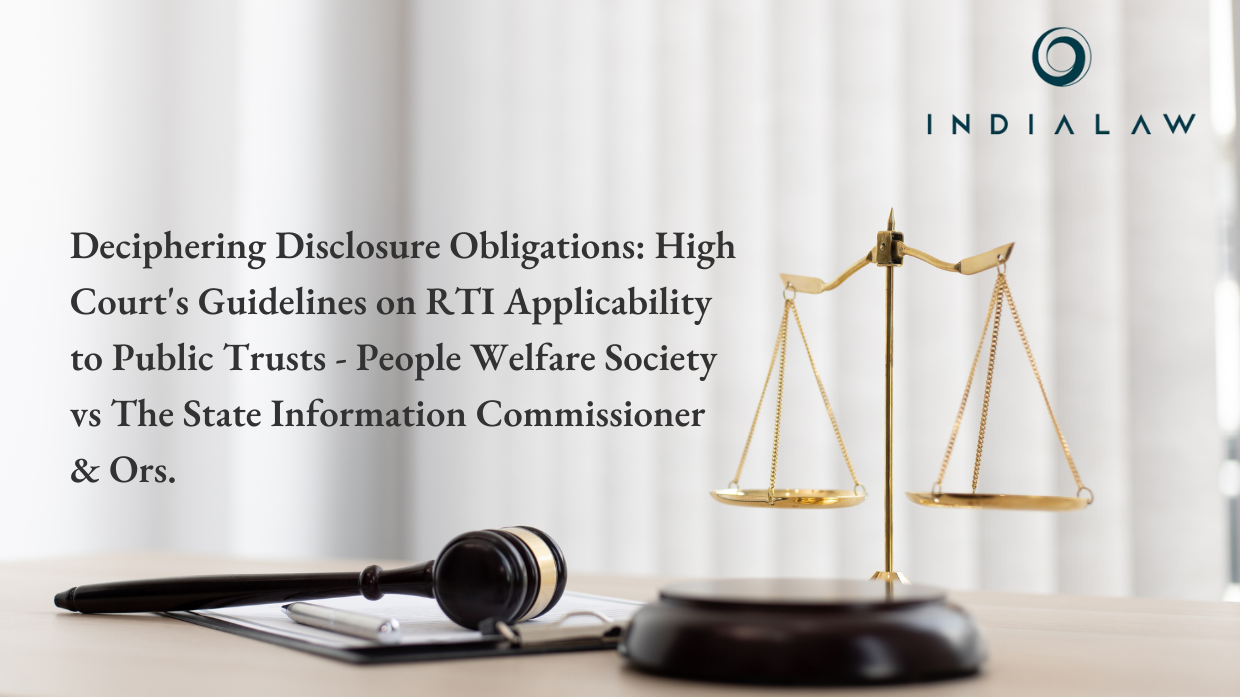Deciphering Disclosure Obligations: High Court’s Guidelines on RTI Applicability to Public Trusts – People Welfare Society vs The State Information Commissioner & Ors.

Abstract:
The judgmenti discussed herein delves into the applicability of the Right to Information Act, 2005 (‘RTI Act’) to public trusts, cooperative societies, and other institutions. The Benchii scrutinizes various legal precedents and interpretations to determine whether entities such as public trusts can be considered “public authorities” under the RTI Act. The judgment emphasizes the distinction between the trust itself and the educational institutions it may administer, as well as the significance of government financing and control in determining RTI obligations. Through a thorough analysis of pertinent legal principles and case law, the court offers clarity on the scope of RTI obligations for different types of entities.
Introduction:
The case under consideration revolves around the interpretation of the (RTI) Act, 2005 in the context of public trusts registered under the Maharashtra Public Trusts Act 1950. The central issue is whether a public trust operating an institution that receives grants from the State is obligated to provide information under the RTI Act. This question hinges on the determination of whether the public trust qualifies as a “public authority” under the RTI Act, thus subjecting it to the disclosure requirements mandated by the Act.
Facts of the case:
The case involves a dispute regarding the applicability of the RTI Act to a public trust registered under the Maharashtra Public Trusts Act, 1950. The factual matrix of the case, as elucidated in the judgment, reveals the following key details.
The Petitioner in this case is a public trust registered under the Maharashtra Public Trusts Act 1950. The Respondents are individuals seeking information related to the activities of the public trust. The public trust operates an institution, presumably an educational or charitable institution, which receives grants from the State. These grants are provided by the Government to support the functioning and activities of the institution administered by the Public Trust. The primary contention between the parties revolves around the interpretation of the RTI Act and its applicability to the Public Trust. The Respondent argues that since the Public Trust administers an institution that receives grants from the State, it qualifies as a “public authority” under the RTI Act. Therefore, it should be obligated to provide information upon request under the provisions of the Act. Conversely, the Petitioner, representing the Public Trust, contests this interpretation, asserting that the trust itself is not a public authority and thus not subject to the disclosure requirements of the RTI Act. Precedents such as Thalappalam Service Coop. Bank Ltd. v. State of Kerala, [(2013) 16 SCC 82] are cited to underscore the significance of State financing in determining the applicability of the RTI Act. These legal principles provide the backdrop against which the Court must assess the arguments presented by the parties and arrive at a reasoned decision.
The decision of the High Court:
The Question framed in the present judgement is as under.
Question:- Whether a Public Trust registered under the provisions of Maharashtra Public Trusts Act 1950, which is running an institution that receives grant from the State is duty bound to supply information sought from it under provisions of Right to Information Act 2005?
In its decision, the High Court of Bombay while answering the aforesaid question has laid down the following crucial factors for determining the applicability of the Right to Information (RTI) Act 2005 to Public Trusts registered under the Maharashtra Public Trusts Act 1950.
Firstly, it stated that if the information sought pertains directly to the public trust itself and not its affiliated institutions, the trust is not obligated to disclose unless it falls within the definition of a “public authority” under section 2(h) of the RTI Act or has received substantial government funding or land concessions. This observation draws from the provisions of the RTI Act and the precedents set in various cases, including Thalappalam Service Cooperative Bank Limited and others. Drawing from the precedent set in Thalappalam Service Cooperative Bank Limited and others, the Court underscored the importance of distinguishing between a Public Trust and the institutions it administers, asserting that the mere administration of an educational institution does not automatically render the trust a public authority under the RTI Act.
Secondly, the Bench emphasized that if the information request concerns the educational or other institutions operated by the public trust, the obligation to disclose depends on the extent of financial support provided by the State. If the funding is substantial, as determined by the Information Commissioner, the institutions may be directed to provide the requested information. This principle is crucial in determining the scope of information disclosure obligations based on the level of government assistance received, as established in prior cases.
Thirdly, the Bench clarified that the Charity Commissioner is not legally obliged to disclose information collected under the Maharashtra Public Trusts Act if it falls under the exempted category specified in Section 8(j) of the RTI Act and lacks statutory backing. This underscores the limitations on information disclosure when certain exemptions apply, as outlined in relevant legal provisions and supported by judicial precedents.
Lastly, the court stated that if the information requested does not fall within the exempted categories outlined in Section 8 of the RTI Act, then information submitted to the authorities under the Maharashtra Public Trusts Act can be disclosed by the authority holding such information. This reaffirms the principle of information accessibility while ensuring compliance with statutory exemptions and procedural requirements. Overall, the decision provides a nuanced framework for determining the disclosure obligations of public trusts under the RTI Act, taking into account statutory provisions, judicial precedents, and the specific circumstances of each case.
The Bench referred several other cases to support its decision. For instance, in the case of Rajeshwar Majoor Kamgar Sahakari Sanstha Ltd. v. State Information Commissioner,(2021 SCC OnLine Bom 2459) wherein the Court held that information accessible to the Registrar of Cooperative Societies under the Cooperative Societies Act must be furnished under the RTI Act, provided it does not fall under any exemptions. This case reinforced the principle that information accessible to a regulatory authority may be subject to disclosure under the RTI Act. The Bench cited Shikshan Prasarak Mandali v. State Information Commissioner, (2015 SCC OnLine Bom 6830) which highlighted that non-government educational institutions receiving grants-in-aid from the government are considered public authorities under the RTI Act. However, this case did not extend the definition of public authority to the trusts or societies administering these institutions, further supporting the court’s distinction between the trust and the institution.
Conclusion:
In conclusion, the Bench provides clarity on the obligations of public trusts, cooperative societies, and similar entities under the RTI Act. By delineating the criteria for determining whether an entity qualifies as a “public authority” under the Act, the judgment offers valuable guidance for future cases and contributes to the development of legal doctrine in the realm of transparency and accountability. The decision underscores the need for a nuanced approach in assessing RTI obligations, taking into account factors such as government financing and control.
________________
- People Welfare Society Vs State Information Commissioner and Others (2024 SCC OnLine Bom 716)
- The Coram consisted of Urmila Joshi-Phalke, J, Anil S. Kilor, J and Avinash G. Gharote, J.
By entering the email address you agree to our Privacy Policy.



